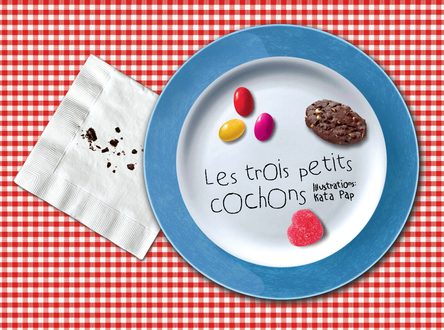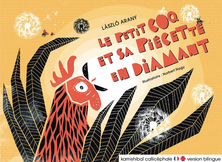Texte integral du livre Les Trois petits cochons - The Three Little Pigs
Les trois petits cochons - The Three Little Pigs
de Kata Pap
aux éditions Callicéphale
Il était une fois une gentille maman cochon, très attentionnée. Un beau jour, elle se rendit compte que ses trois petits cochons étaient devenus grands, et qu’il n’y avait plus assez de place pour eux dans la maison. Alors elle les laissa partir sur la grande route de la vie ; ils allaient maintenant devoir se débrouiller tout seuls.
Once upon a time, there was a good, hardworking sow. One fine morning, she woke to find that her three little piglets were all grown up, and there was no more room for them all in their little house. So she sent them out to make their way in the world.
Le premier petit cochon trouva sur son chemin un gros tas de paille.
« Oh chic alors !, fit-il tout heureux. Avec ce tas de paille je vais pouvoir me construire une jolie petite maison ! »
Le deuxième petit cochon, lui, trouva un gros tas de branchages.
« Sûr que ce tas de branchages, ça pourra me faire une cabane magnifique ! », s’écria-t-il avec joie.
Le troisième petit cochon, lui, tomba sur un amas gigantesque de pierres de taille.
« Eh bien, avec ce tas de pierres, observa-t-il avec satisfaction, je vais pouvoir me construire une maison bien solide ».
The first little pig found a great big bale of straw on his way.
"Aha!" he remarked, "this will do me very well to build a house with!"
The second little pig found a great big pile of sticks.
"This will make an excellent house, methinks!"
The third little pig found a great big pile of limestone.
"I can build myself a good, strong house with this," he said with satisfaction.
Ils s’engagèrent tous les trois dans leurs travaux de construction.
Le premier petit cochon bricola rapidement sa maison de paille puis il partit se dorer la pilule dans un champ.
Le deuxième petit cochon, lui aussi, assembla à la hâte son cabanon de branchages.
« Ça ira bien comme ça. Je pourrais me mettre à l’ombre, et les jours de pluie, il n’y aura aucune fuite à l’intérieur », fit-il en examinant d’un air satisfait son ouvrage.
So they got to building.
The first little pig was soon finished with his house of straw and went out to lie in the sun.
The second little pig also quickly finished his house of sticks.
"That’ll do. It’ll give me shade, and keep me dry when it rains," he said, approvingly.
Dès qu’ils en eurent fini, les deux premiers petits cochons se donnèrent du bon temps, tandis que leur frère, le troisième petit cochon, continua de transporter infatigablement les pierres pour sa propre maison.
« Allons donc, frérot ! c’est vraiment bête de te donner tant de peine ! », s’esclaffèrent les deux petits cochons paresseux en s’adressant à leur frère qui s’activait.
« Laisse donc ces pierres, construit ta maison avec de la paille ou avec du bois, comme nous ; elle sera terminée beaucoup plus vite et il te restera du temps pour danser, pour t’amuser ! »
Mais celui-ci ne les écoutait pas.
Un jour viendra, leur répondit-il, où vous comprendrez pourquoi une maison, il faut la construire en pierre.
Ses deux frères firent un signe de dédain, sans même l’écouter, et continuèrent à faire la fête.
As soon as they were done with building, the first two little pigs set about making merry, while their brother kept on tirelessly carting the stone to his own little construction site.
"Oh, brother, why go to all that effort? Forget the stones, and build your house from sticks or straw, like us. You’ll see, you’ll be done much quicker. You’ll have more time for dancing and for making merry!" called the two lazy little pigs to their hardworking brother.
But he paid them no heed, replying only that the time would come when they’d see why a house should be of stone.
But his brothers just shrugged, ignored him, and continued having fun.
Un jour, un méchant loup, affamé, vint à passer dans les environs. Il sentit aussitôt la bonne odeur de petit cochon et prit la direction de la maison de paille.
« Laisse-moi entrer, petit cochon, lança-t-il de l’extérieur d’une voix toute mielleuse, je t’ai apporté de bonnes choses à manger ! »
Mais le petit cochon se rappela ce que sa maman lui avait appris concernant le loup, et il lui répondit :
« Par mes oreilles, par mon bidon, par mon peton, nooon !!! »
One day, a big, bad, hungry wolf came to their district. He smelled the little pigs at once and headed straight for the house of straw.
“Little pig, little pig, let me in!” he called, sweet as sweet can be. “I’ve brought you something good to eat!”
But the little pig remembered what his mother had told him about wolves and replied:
“By the hair on my chinny-chin-chin, I will not let you in!”
« Non ? », fit le loup, maintenant d’une voix qui n’était plus mielleuse du tout. « Alors je vais souffler et je vais tout casser, ta maison va s’écrouler !! », vociféra-t-il.
Et il se mit à souffler, à tout casser tout en trépignant de colère.
En moins de temps qu’il n’en faut pour le dire, la maison de paille s’écroula…
Le petit cochon arriva tout juste à prendre la fuite et courut jusqu’à la maison construite par son frère avec des branchages.
“No?” said the wolf, not so sweet any more. “Then I’ll huff, and I’ll puff, and I’ll blow your house down!” he roared, and started blowing.
The house of straw collapsed in the blink of an eye, and the little pig barely made it out to his brother’s house of sticks.
Le lendemain, le méchant loup vint roder autour de la maison de branchages.
« Laissez-moi entrer, petits cochons, lança-t-il devant la porte, je sais que vous êtes là tous les deux, à l’intérieur ! »
Les deux petits cochons échangèrent un regard :
« Par nos oreilles, par notre bidon, par nos petons, nooon !!! », lui crièrent-ils.
The next day, the big, bad wolf started hanging around the house made of sticks.
“Little pigs, little pigs, let me in!” he cried, “I know you’re in there!”
The little pigs looked at one another.
“By the hairs on our chinny-chin-chins, we will not let you in!”
« Non ? », hurla le loup d’une voix terrifiante. « Alors je vais souffler et je vais tout casser, la maison va s’écrouler !! »
Et en effet il souffla et hurla plus fort encore, trépigna plus encore que le jour précédent. La maison de branchages s’écroula, elle aussi, et les deux petits cochons arrivèrent tout juste à prendre la fuite, courant tous les deux jusqu’à la maison du troisième frère, la maison de pierre.
“Oh no?” the wolf roared, fit to frighten man and beast. “In that case, I’ll huff, and I’ll puff, and I’ll blow your house down!”
And so he did, huffing, and puffing, and blowing harder still than he had the day before. The two little pigs barely made it out to their brother’s house, the house he’d made of stone.
Le troisième jour, le loup se présenta devant la maison de pierre. Encore une fois il ronchonna, rouspéta, fit des blablas, fit des manières, voulut tromper la confiance des trois petits cochons par de douces et fausses promesses. Ils ne cédèrent pas bien sûr, pas plus cette fois-là. Le loup se mit alors à souffler, à pousser des hurlements, à trépigner ; mais rien ne se passa. Il s’arc-bouta contre les murs, mais ils ne bougèrent pas d’un centimètre. La colère montait en lui.
« Ce ne sont quand même pas trois petits cochons, hurla-t-il finalement fou de rage, qui vont se montrer plus malins que moi !!! »
The third day, the wolf appeared by the stone house, all sweet-talk and honeyed words, swallowing his anger, trying to trick the three brothers with false promises of this and that. But the brothers would have none of it. So the wolf began to huff, and to puff, and scream and shout, but nothing happened. He even tried pushing the wall over, but it didn’t budge an inch. The wolf got very angry then.
“I won’t let three little pigs get the better of me!” he fumed.
Il dénicha une échelle pour grimper sur le toit.
« Je vais me frayer un passage, gronda le loup plein de rage, en me laissant glisser le long de la cheminée ; et je vais les dévorer tous les trois d’un seul coup ! »
C’était sans compter sur le troisième petit cochon, – lui qui savait très bien pourquoi il fallait bâtir sa maison avec des pierres de taille et non pas avec de la paille ou avec des branchages. Il avait toujours, lui, trois pensées d’avance sur le méchant loup. Il plaça donc sur le feu une grande marmite pleine d’eau, juste au-dessous du conduit de cheminée. L’eau se mit à bouillir, à faire de grosses bulles.
C’est à ce moment-là que l’histoire a pris une tournure inattendue…
Qu’est-ce que vous en pensez, les enfants ? Qu’est-ce qui lui est arrivé, au loup ?
The wolf fetched a ladder to climb up on the roof with.
“I’ll climb down the chimney, I will, and gobble up those little pigs, hairy chins and all!” he muttered.
But the third little pig, the one who knew why a house should be of stone (and not of sticks or straw), was always three steps ahead of the big, bad wolf. So he put a big pan of water on the fire, underneath the chimney. And the water began to boil and seethe.
Just then, the tale took a turn.
What do you think, children, what happened to the wolf?
Peu importe ce qui lui est arrivé, le grand méchant loup connut une fin pitoyable. Mais les trois petits cochons, eux, ils ont continué à vivre, aussi joyeusement qu’auparavant.
Well, whatever it was that happened, this much is certain: the big, bad wolf came to a sticky end and the three little pigs lived happily ever after.





















